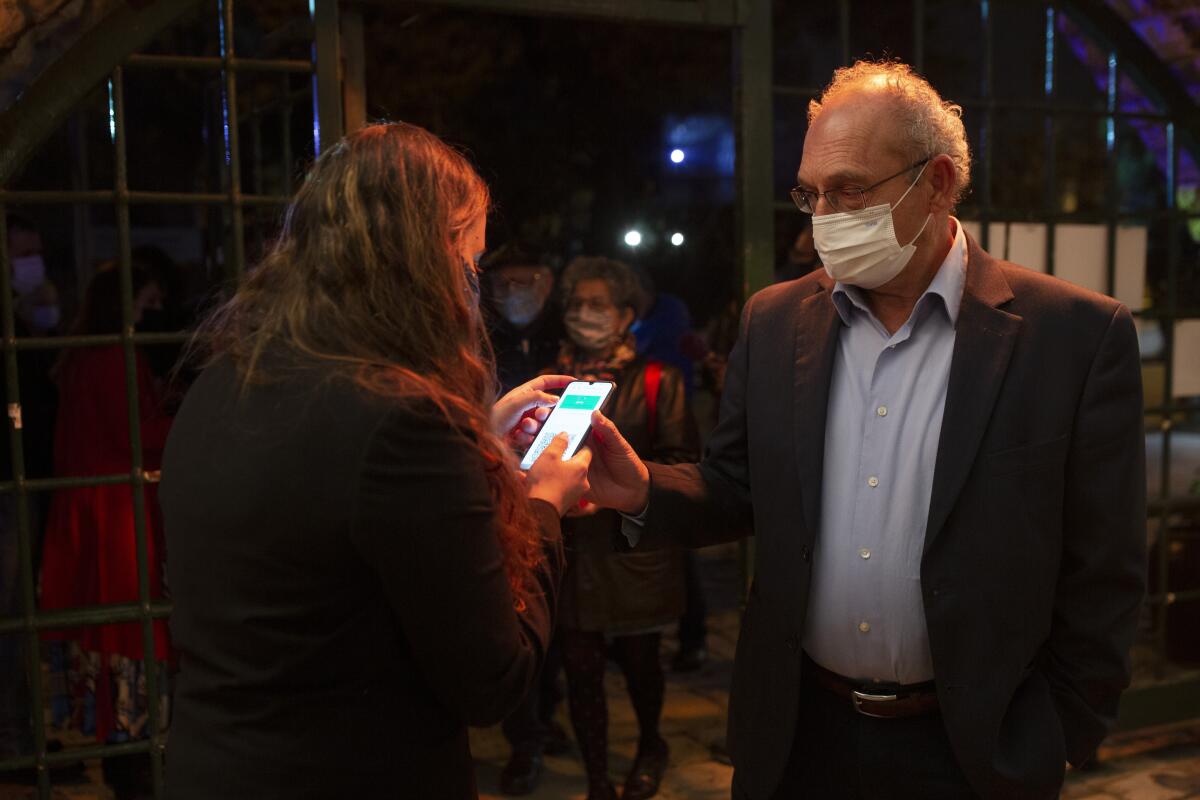Column: The GOP is hating on vaccine passports. Take it as a sign the passports are legitimate

Anyone with a Twitter presence gets used to setting off the occasional firestorm. If you’re sane, you just keep your distance. A conflagration I ignited Monday, however, took me by surprise and left me wanting to delve into the fury.
The 245 characters I wrote read as follows: “Vaccine passports are a good idea. Among other things, it will single out the still large contingent of people who refuse vaccines, who will be foreclosed from doing a lot of things their peers can do. That should help break the resistance down.”
The responses came packed with outrage and venom. Easily half analogized the idea of passports to Jews forced to wear yellow stars in Hitler’s Germany, or to South African apartheid. I was either a fascist, a Nazi or a communist. A large number included threats of personal violence.
The mystery cleared up for me with the report that Florida Gov. Ron DeSantis and other members of the mask-avoiding Trump wing of the Republican Party have fixed on vaccine passports as “completely unacceptable.” (If I’d read the nasty comments more carefully, I’d have noticed in fact that one came from Donald Trump Jr).
What accounts for such broad and passionate opposition to the idea of vaccine passports, which are already in use in Israel, and in the works in Europe and Japan as well as the U.S.?
I think the nub of the matter is a wrongheadedness about the appropriate balance between freedom and authority when a pandemic is raging.
First, let’s sweep away the most far-fetched of the objections.
Comparisons to yellow stars and apartheid, for example, aren’t useful. There is nothing heinous, illegitimate or even out of the ordinary about officialdom classifying groups differently. When Congress passes a corn subsidy, it discriminates between one kind of farmer and another.
Discrimination becomes evil, and unconstitutional, when it is directed at a subset of people based on race, religion or some other immutable and court-protected characteristic. That’s a nonstarter with vaccine passports. And the rules would apply equally to all.
More unhelpful objections arise from the tinfoil hat crowd who see vaccinations as some form of government conspiracy. COVID-19 has killed more than 550,000 Americans, and carefully vetted data and anecdotal evidence show that the approved vaccines are safe and effective against it. If virulent opposition to issuing vaccine passports stems from general hostility toward the whole idea of government and science, there’s really not much to discuss.
That leaves the balance of the critics. Perhaps they are earnest objectors who may accept that the virus is real and the vaccine salutary, yet still see vaccine passports as authoritarian, despotic and wrong.
Most Americans don’t object to a number of routine government actions and laws that get much closer to personal interference than issuing a vaccine passport. You can’t be a pilot without a license; it’s too dangerous. You can’t drive a car without getting — and displaying if asked — a driver’s license.
And even the staunchest libertarian — my Twitter critics present themselves as some version of libertarians — would allow that the proprietors of a restaurant, concert hall or airline are perfectly within their rights if they want to require patrons to be vaccinated and prove it.
The real issue, the one that turns the situation from prosaic to despotic, is that passports represent the government pushing people to get inoculated, or to use the phrase that may have lit the match on Twitter, they “break resistance down.” That’s what smacks of a deep intrusion into private lives.
The people who are up in arms about vaccine passports also seem to filter the issue through the culture wars and Trumpian resentment. Their view is that the passports are all about victimizing them, that not having one will brand them with a scarlet letter.
That’s juvenile and solipsistic. The reasoning behind vaccine passports is protection. Those who aren’t vaccinated are a danger to one another and even to the vaccinated (the vaccines are not 100% effective). They are also a danger to the wider effort to end the pandemic because they are more likely to get infected and to spread the virus, increasing the odds of ever-more virulent variants and decreasing the chance that COVID-19 can be wiped out. And if they get ill, the cost isn’t theirs alone. The government — that is, all of us — will foot the bill in any number of ways.
Governments not only may but should try to influence private behavior so as protect society at large and in particular its most vulnerable members. It also may try to prevent avoidable expense that has to be borne by the public at large.
Let me repeat: Vaccine passports are a good idea. They don’t discriminate illegally or immorally. They allow people who are at little to no risk of illness or of spreading infection to get back into circulation and the world to get back to normal. That passports incentivize the hesitant to get vaccinated is a beneficial side effect, not a malevolent act on the path to tyranny.
We need to inch our way back to the shared common-sense idea that government does no evil when it acts to promote public health and help the most vulnerable.
More to Read
A cure for the common opinion
Get thought-provoking perspectives with our weekly newsletter.
You may occasionally receive promotional content from the Los Angeles Times.










